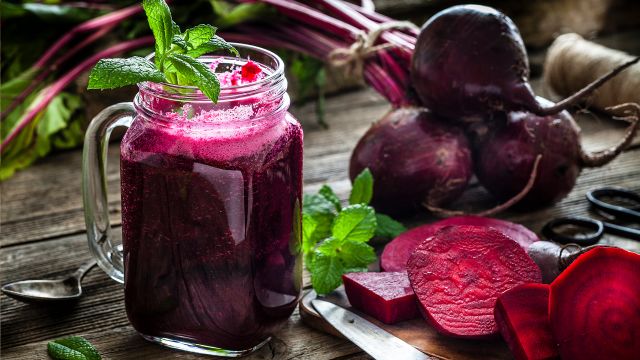Eating an abundance of fruits and vegetables improves your health, but did you know that beets and leafy greens are especially important to your heart health? New research is confirming that a daily dose helps to prevent heart disease because they contain nitrates that are converted to nitric oxide, a powerful molecule that naturally improves blood circulation.
What do beets have in common with heart, brain, sexual health and athletic performance?
Scientists and nutritionists have long agreed that the phytochemicals found in fruits and vegetables play a significant role in reducing the risk of chronic disease. A 2016 study published in the American Journal of Clinical Nutrition found that the nitrates in beet juice also offers significant cardiovascular benefits. Researchers concluded that a sustained intake improves vascular function in those with high cholesterol, and helps to prevent against atherogenesis.
Nitric Oxides and Heart Health
A group of scientists won the 1998 Nobel Prize in Medicine for discovering the role that nitric oxide plays in signaling our blood vessels to relax and expand. Open blood vessels keep the arteries supple and enhance oxygen efficiency and delivery. That improves blood circulation throughout our body, including to the heart, brain and muscles. It’s the reason that doctors prescribe nitroglycerine (which converts to nitric oxide and opens the arteries) for angina (chest pain) or a heart attack.
Nitric oxide improves:
- blood flow to the heart, brain and muscles
- endothelial function
- blood pressure
- circulation
- vascular health
- glucose metabolism
- athletic performance
Nitric oxide decreases:
- inflammation
- oxidative stress
- erectile dysfunction
Nitric oxide is made naturally within our bodies by the endothelium, or the lining of blood vessels and the heart. Using the saliva in our mouth and microbes in our gut, our bodies convert nitrates into nitric oxide. But nitric oxide levels can get depleted quickly and need to be replenished. Endothelial cells don’t function as well without adequate levels of nitric oxide, which leaves us feeling tired and depleted. Low levels of nitric oxide can also lead to atherosclerosis, hypertension, stroke, inflammation and insulin resistance.
Nitric oxide production declines as we age and when the endothelial lining in our arteries suffers damage from inflammation or high blood pressure. Studies show that men make 50 percent less nitric oxide than teenagers by age 40, while women make 35 percent less nitric oxide by age 50.
Lifestyle and Diet Influence Nitrix Oxide Levels
A sedentary lifestyle and a diet low in nitrate-rich plant foods can lead to low levels of nitric oxide. Nitric oxide is also stimulated during exercise. Acid reflux medications such as Prilosec, Nexium and Dexilant can also lower nitric oxide levels due to their negative impact on healthy gut microbes that help convert nitrates to nitric oxide. Similarly, an excessive amount of mouthwash can destroy friendly, nitric oxide producing bacteria in the mouth.
Other Benefits of Nitric Oxide:
- Better brain function. Nitric oxide is not just good for the heart, but essential for brain health--adequate blood flow to the brain is necessary for cognitive function. Nitrite oxide from nitrate-rich food has been shown to increase blood flow to the brain, especially in the aging brain.
- Good for sports performance. The impact of nitric oxide from beets has long been recognized for enhancing sports performance. In addition to increasing blood flow to the muscles, nitric oxide from beets reduces oxygen needs and reduces blood pressure, increasing efficiency and improving athletic performance.
- Nitrate rich foods. It is important to incorporate natural nitrate-rich foods such as beets, cocoa and leafy greens into your diet to promote continuous nitric oxide production.
Beets
Beets are one of the most concentrated sources of natural nitrates. Beet juice has been widely studied for its positive impact on health and athletic performance. Research shows a strong correlation between the consumption of beet juice and lower levels of blood pressure. For example, a 2010 study published in American Heart Association Journal Hypertension found that people who drank beet juice had lower blood pressure within 24 hours. Another 2010 study published in the Nutrition Journal showed that subjects’ blood pressure dropped within just six hours after drinking 500 grams of beetroot juice.
Beets are also an excellent source of folate, potassium, vitamin C, manganese, zinc, copper, iron and fiber, as well as antioxidants such as polyphenols and betalains. Betalains have been shown to reverse the effects of free radical damage and oxidative stress in humans, even at low to moderate levels.
Dark Cocoa
Studies have found cocoa increases nitric oxide production, improves endothelial function and lowers blood pressure. A 2011 study published in The Journal of Clinical Biochemistry and Nutrition shows flavanols, such as those found in cocoa, establish optimal nitric oxide levels and blood pressure.
Looking for other ways to eat more healthily? Reverse heart disease and diabetes, lose weight and reduce your risk of cancer with these tips from Dean Ornish.






